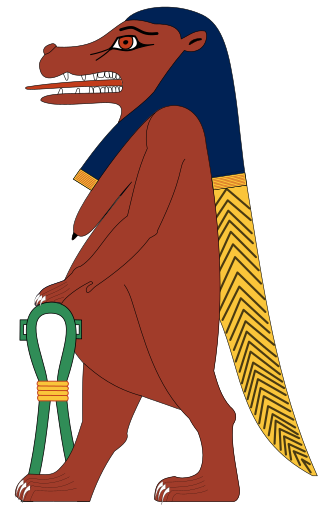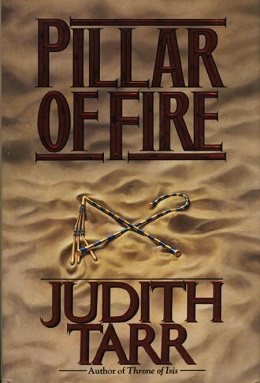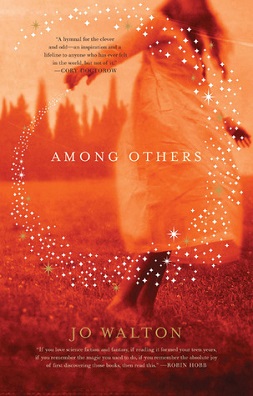
In ancient Greek mythology and religion, Persephone, also called Kore or Cora, is the daughter of Zeus and Demeter. She became the queen of the underworld after her abduction by and marriage to her uncle Hades, the king of the underworld.

In ancient Greek religion and mythology, Hestia is the virgin goddess of the hearth, the right ordering of domesticity, the family, the home, and the state. In myth, she is the firstborn child of the Titans Cronus and Rhea, and one of the Twelve Olympians.

Proserpina or Proserpine is an ancient Roman goddess whose iconography, functions and myths are virtually identical to those of Greek Persephone. Proserpina replaced or was combined with the ancient Roman fertility goddess Libera, whose principal cult was housed in the Aventine temple of the grain-goddess Ceres, along with the wine god Liber.

Harry Norman Turtledove is an American author who is best known for his work in the genres of alternate history, historical fiction, fantasy, science fiction, and mystery fiction. He is a student of history and completed his PhD in Byzantine history. His dissertation was on the period AD 565–582. He lives in Southern California.

In ancient Roman religion, Ceres was a goddess of agriculture, grain crops, fertility and motherly relationships. She was originally the central deity in Rome's so-called plebeian or Aventine Triad, then was paired with her daughter Proserpina in what Romans described as "the Greek rites of Ceres". Her seven-day April festival of Cerealia included the popular Ludi Ceriales. She was also honoured in the May lustration (lustratio) of the fields at the Ambarvalia festival: at harvest-time: and during Roman marriages and funeral rites. She is usually depicted as a mature woman.

In ancient Roman religion and mythology, Liber, also known as Liber Pater, was a god of viticulture and wine, male fertility and freedom. He was a patron deity of Rome's plebeians and was part of their Aventine Triad. His festival of Liberalia became associated with free speech and the rights attached to coming of age. His cult and functions were increasingly associated with Romanised forms of the Greek Dionysus/Bacchus, whose mythology he came to share.

In ancient Roman religion and myth, Caca or Cacia is the giantess sister of Cacus, the son of Vulcan who stole cattle from Hercules during the course of his western labors. Caca betrays her brother by revealing the location of the cattle to Hercules, who had in turn stolen the cattle from Geryon.

Carnuntum was a Roman legionary fortress and headquarters of the Pannonian fleet from 50 AD. After the 1st century, it was capital of the Pannonia Superior province. It also became a large city of 50,000 inhabitants.

Jo Walton is a Welsh and Canadian fantasy and science fiction writer and poet. She is best known for the fantasy novel Among Others, which won the Hugo and Nebula Awards in 2012, and Tooth and Claw, a Victorian era novel with dragons which won the World Fantasy Award in 2004. Other works by Walton include the Small Change series, in which she blends alternate history with the cozy mystery genre, comprising Farthing, Ha'penny and Half a Crown. Her fantasy novel Lifelode won the 2010 Mythopoeic Award, and her alternate history My Real Children received the 2015 Tiptree Award.

In Ancient Egyptian religion, Taweret is the protective ancient Egyptian goddess of childbirth and fertility. The name "Taweret" means "she who is great" or simply "great one", a common pacificatory address to dangerous deities. The deity is typically depicted as a bipedal female hippopotamus with feline attributes, pendulous female human breasts, the limbs and paws of a lion, and the back and tail of a Nile crocodile. She commonly bears the epithets "Lady of Heaven", "Mistress of the Horizon", "She Who Removes Water", "Mistress of Pure Water", and "Lady of the Birth House".

Lest Darkness Fall is an alternate history science fiction novel written in 1939 by American author L. Sprague de Camp. Alternate history author Harry Turtledove has said it sparked his interest in the genre as well as his desire to study Byzantine history.
Judith Tarr is an American fantasy and science fiction author.
Susan Shwartz is an American author.

Pillar of Fire is a 1995 historical fantasy novel by Judith Tarr. It deals with the reigns of Egyptian pharaohs Akhenaten and Tutankhamun and the Exodus from the perspective of a Hittite slave girl of Ankhesenpaaten. It draws heavily on Ahmed Osman's suggestion that Moses and Akhenaten were the same person.

Ha'penny is an alternative history novel written by Jo Walton and published by Tor Books. First published on October 2, 2007, it is the second novel of the Small Change series.

Among Others is a 2011 fantasy novel written by Welsh-Canadian writer Jo Walton, published originally by Tor Books. It is published in the UK by Corsair. It won the 2012 Nebula Award for Best Novel, the Hugo Award for Best Novel and the British Fantasy Award, and was a nominee for the World Fantasy Award for Best Novel.
Bibliography of science fiction, fantasy, historical fiction and nonfiction writer Harry Turtledove:












